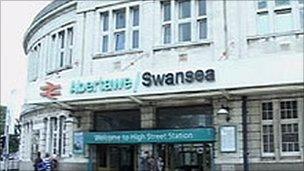London-Cardiff rail electrification, but not to Swansea
- Published
A £1bn electrification of the main rail line between London and Cardiff is to go ahead, it has been confirmed.
However, the Welsh Assembly Government had been lobbying the Westminster coalition to electrify the Great Western line as far as Swansea.
But the UK government said it had found "no evidence of a pattern of demand" and trains will switch to diesel power between Cardiff and Swansea from 2017.
Electrifying the valleys commuter lines remains a future possibility.
A plan to electrify the line was announced by the previous Labour government in 2009.
Ministers in the assembly government were pressing the Conservative-Liberal Democrat coalition in Westminster to stick to the plan.
A decision on whether to electrify the line was postponed last November.
Supporters say electrification could cut journey times from Cardiff to London by about 20 minutes, and argue electric trains are cleaner and cheaper.
In a statement to MPs, Transport Secretary Philip Hammond said he had looked carefully at the arguments in favour of electrifying the line as far as Swansea.
He said the business case was heavily dependent on the frequency of service.
'No evidence'
"Services between London and Swansea currently operate at a frequency of only one train an hour off-peak," he said.

Trains will switch automatically to diesel power between Cardiff and Swansea
"There is no evidence of a pattern of demand that would be likely to lead imminently to an increase in this frequency.
"Consequently, I regret to say that there is not, at present, a viable business case for electrification of the main line between Cardiff and Swansea."
Trains will switch automatically to diesel power as they leave Cardiff.
Mr Hammond said that because of speed limits dictated by the geometry of the line "there would be no time saving benefits from electrifying the line from Cardiff to Swansea".
A plan to electrify the Great Western line from London to Berkshire and Oxfordshire has already got the go-ahead.
Mr Hammond said London-Cardiff journey times would come down to 1hr 42 min, while 22 minutes would be saved off London-Bristol journeys.
Welsh Secretary Cheryl Gillan said the announcement was vital to the recovery of the Welsh economy and that the case for electrification to Swansea remained under review.
She said her department will work with the assembly government on a business case to electrify commuter lines north of Cardiff to Treherbert, Aberdare, Merthyr Tydfil and Rhymney, and to Penarth and Barry in the Vale of Glamorgan.
'Economic lifeline'
"On St David's Day, this is excellent news for all parts of south and west Wales," she said.
Mrs Gillan said the previous government had 13 years to electrify the line "but failed to do anything beyond headline-grabbing stunts".
But Labour claimed businesses and passengers living west of the Welsh capital had suffered a "St David's Day disappointment" as the electrification would not extend as far as Swansea.
Deputy First Minister Ieuan Wyn Jones said he was pleased the UK government had recognised the strength of the case to electrify lines in the valleys, but was disappointed Swansea had been left out of today's announcement.
"This is a blow to our aspirations to see economic benefits flow to the whole of Wales and will be a particularly damaging to the south west of Wales," Mr Jones said.
He told BBC Radio Wales it would be more cost effective to include Swansea at the same time as Cardiff, rather than trying to upgrade the line in two stages.
First Great Western managing director Mark Hopwood said: "This is great news for our customers and the railway industry as a whole as it will bring reductions in journey time and a more reliable, environmentally friendly service."
CBI Wales director David Rosser welcomed "an excellent announcement", adding: "The Great Western main line is an essential economic lifeline for the south Wales economy.
"Today's announcement from the UK government will reinforce Cardiff as a 21st Century city, enabling it to play a key role in creating a more balanced UK economy with wealth creation more evenly spread across the nations and regions of the UK."
Although it was disappointing that the scheme would not go as far as Swansea, he added: "It would have been completely unacceptable for Wales to have been left out of the UK's rail modernisation plans".
Cardiff council leader Rodney Berman - who lobbied for electrification of the Great Western line with Swindon and Bristol councils - said: "Today's decision has followed a lot of effort stressing the benefits electrification will bring."
Plaid Cymru parliamentary leader Elfyn Llwyd said: "Labour left Wales as the only country in Europe alongside Albania and Moldova without a single mile of electrified track."
Peter Black, Lib Dem AM for south Wales west, said the announcement was a big step forward, but added: "This decision sends the wrong message to business investors about the south west Wales economy."
- Published15 January 2011
- Published25 November 2010